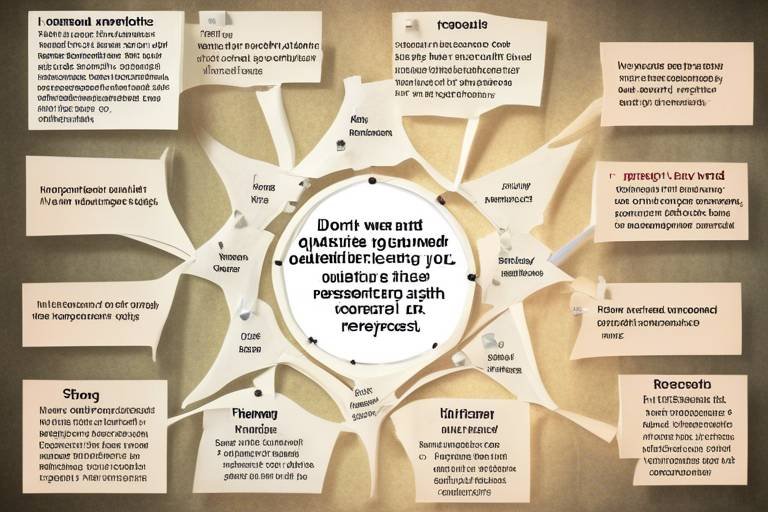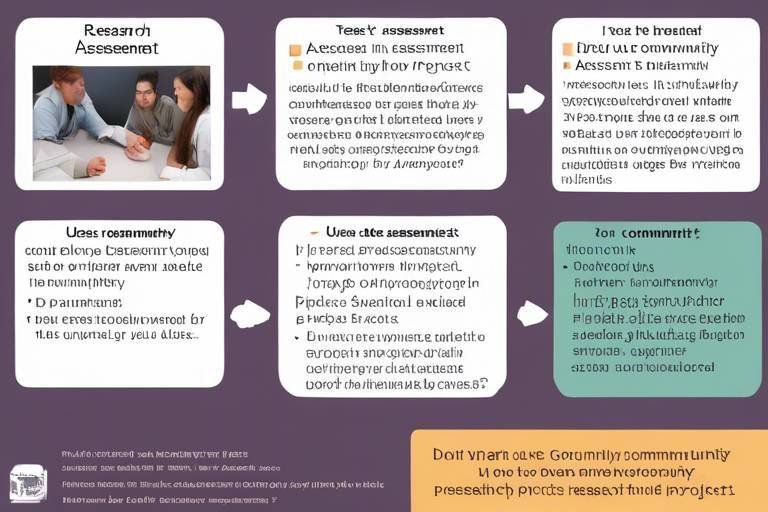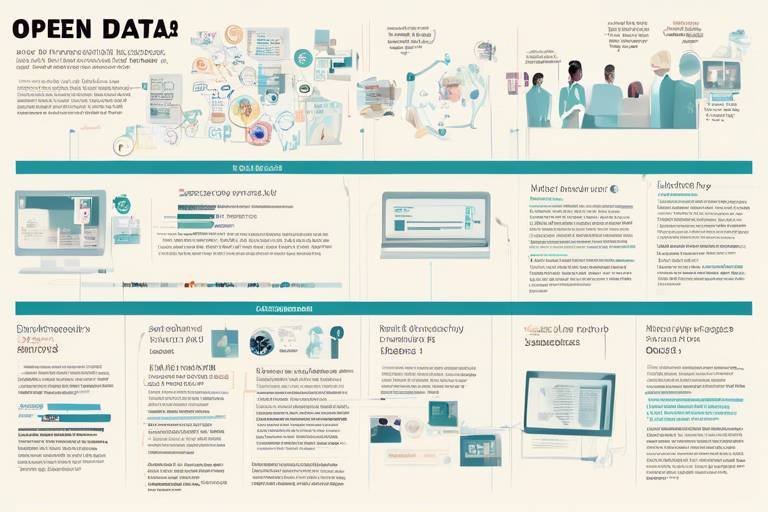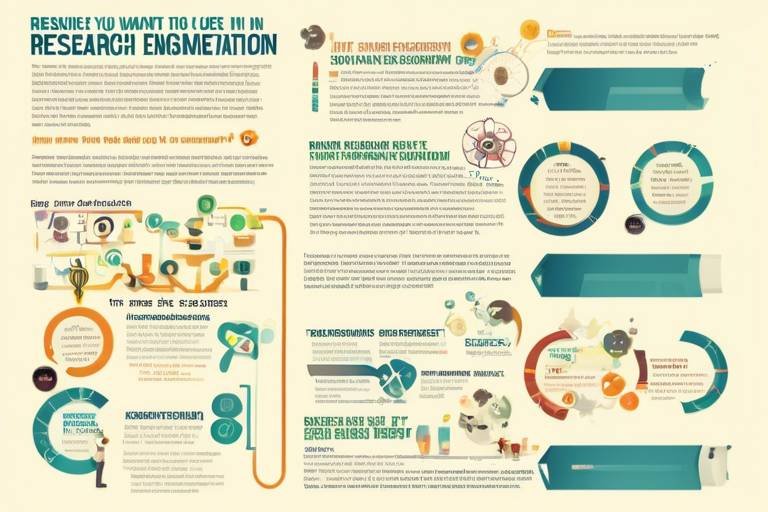How to Apply Grounded Theory in Qualitative Research
Grounded theory is not just a methodology; it's a transformative approach that empowers researchers to uncover deep insights from qualitative data. By focusing on the data itself, grounded theory allows for the development of theories that are rooted in real-world observations rather than preconceived notions. Imagine embarking on a journey where each piece of data is a stepping stone, leading you toward a robust understanding of social phenomena. This article will guide you through the principles and practices of grounded theory, illuminating its application and significance in generating theories from data.
Grounded theory emerged in the 1960s, pioneered by sociologists Barney Glaser and Anselm Strauss. It arose from the need to develop theories that are closely linked to the data collected during research. Unlike traditional research methods that often start with a hypothesis, grounded theory begins with data collection, allowing theories to emerge organically. This approach fosters a deep connection between the researcher and the data, leading to findings that are both relevant and applicable. Grounded theory is not simply about gathering data; it's about understanding the underlying patterns and relationships that inform human behavior.
At the heart of grounded theory are several key principles that guide researchers in their quest for knowledge. These principles include:
- Data Collection: Gathering rich, qualitative data through various methods.
- Constant Comparative Analysis: Continuously comparing data throughout the research process.
- Theoretical Sampling: Selecting participants based on emerging theories to refine understanding.
These principles are crucial for developing robust theories that accurately reflect the complexities of human behavior and social interactions.
Effective data collection techniques are essential in grounded theory research. Researchers can utilize a variety of methods, including interviews, observations, and focus groups, to gather rich qualitative data. Each technique offers unique insights, contributing to a comprehensive understanding of the research subject. For instance, interviews can delve into personal experiences, while observations can provide context to those experiences. By employing multiple data collection techniques, researchers can create a more nuanced picture of the phenomena they are studying.
Interviews serve as a primary data source in grounded theory research. They can take various forms, such as structured, semi-structured, or unstructured interviews. The choice of interview style significantly impacts the depth of information gathered. For example, unstructured interviews allow participants to express their thoughts freely, often leading to unexpected insights. In contrast, structured interviews provide consistency across responses but may limit the richness of the data. The key is to choose an interview style that aligns with the research goals and encourages participants to share their stories.
Observational methods provide context and depth to qualitative research. By observing participants in their natural environments, researchers can gain insights into behaviors and interactions that may not be captured through interviews alone. Observations can reveal patterns of behavior, social dynamics, and contextual factors that influence participants' actions. This complementary approach enriches the data collection process, allowing for a more holistic understanding of the research topic.
Theoretical sampling is a critical aspect of grounded theory. Unlike random sampling, theoretical sampling involves selecting participants based on their relevance to the emerging theories. As researchers collect and analyze data, they identify gaps in their understanding and seek out participants who can provide further insights. This iterative process ensures that the research remains focused and that the theories developed are comprehensive and well-informed.
Data analysis in grounded theory involves systematic coding and categorization of data. Researchers engage in an iterative process, refining concepts as they progress. The goal is to identify patterns and relationships within the data, ultimately leading to the development of grounded theories. This process is not linear; it involves revisiting data multiple times, allowing for deeper insights to emerge.
Open coding is the initial step in data analysis. During this phase, researchers identify and label concepts in the data, laying the groundwork for further analysis. This stage is crucial as it helps researchers to break down the data into manageable pieces, making it easier to identify patterns and themes. Open coding encourages a fresh perspective, allowing researchers to approach the data without bias.
Following open coding, researchers move to axial and selective coding, which help in refining categories and developing theories. Axial coding involves linking categories together, exploring the relationships between them, while selective coding focuses on developing a core category that encapsulates the main findings. These stages are vital in theory construction, as they enable researchers to synthesize their findings into coherent narratives that reflect the complexities of the data.
While grounded theory offers a powerful framework for qualitative research, researchers often face challenges when applying it. Common obstacles include data overload and maintaining theoretical focus. The sheer volume of qualitative data can be overwhelming, making it difficult to identify key themes and insights. To overcome these challenges, researchers can employ strategies such as setting clear research questions, utilizing coding software, and regularly revisiting their theoretical frameworks to ensure alignment with the data.
Grounded theory has diverse applications across various fields, including sociology, psychology, healthcare, and education. Its versatility in generating valuable insights makes it a popular choice among researchers. For instance, in healthcare, grounded theory can be used to explore patient experiences and inform the development of patient-centered care models. In education, it can help understand the factors influencing student engagement and learning outcomes. The potential applications are vast, making grounded theory a valuable tool for researchers in multiple disciplines.
In conclusion, grounded theory is a vital methodology in qualitative research, enabling researchers to generate theories that are grounded in real-world data. Its principles and practices offer a structured yet flexible approach to understanding complex social phenomena. As researchers continue to explore and develop this methodology, future directions may include integrating technology and digital tools to enhance data collection and analysis. By embracing these innovations, grounded theory can evolve, providing even deeper insights into the human experience.
- What is the main goal of grounded theory? The main goal of grounded theory is to develop theories that are directly rooted in qualitative data, providing a deeper understanding of social phenomena.
- How does theoretical sampling differ from random sampling? Theoretical sampling involves selecting participants based on their relevance to emerging theories, whereas random sampling selects participants without regard to their potential contribution to the research.
- What are some common challenges faced in grounded theory research? Common challenges include data overload, maintaining theoretical focus, and ensuring a comprehensive exploration of the research topic.

Understanding Grounded Theory
Grounded theory is more than just a methodology; it's a way of thinking about research that allows you to build theories directly from the data you collect. Imagine walking into a vast forest without a map. Instead of following a predetermined path, you explore the terrain, taking notes on what you see and hear. This is akin to how grounded theory operates—researchers immerse themselves in the data, letting it guide them toward emerging patterns and insights. Originating in the 1960s through the work of sociologists Barney Glaser and Anselm Strauss, grounded theory was designed to address the inadequacies of existing theories that often failed to encompass the complexities of social phenomena.
The foundational concept behind grounded theory is that theories should be derived from data rather than imposed on it. This contrasts sharply with traditional research methods, where hypotheses are formed before data collection. Instead, grounded theory advocates for a more organic approach, allowing the data to speak for itself. This method is particularly beneficial in qualitative research, where human experiences and social contexts are rich and nuanced.
At its core, grounded theory involves a few key components:
- Data Collection: Gathering rich qualitative data through various means.
- Constant Comparative Analysis: Continuously comparing new data with existing data to refine categories and develop theories.
- Theoretical Sampling: Selecting participants based on emerging theories to ensure comprehensive exploration.
As researchers dive into their data, they engage in a process of iteration—revisiting their data and refining their theories as new insights emerge. This cyclical process not only enhances the richness of the data but also strengthens the theories developed. Grounded theory thus fosters a dynamic relationship between data and theory, making it a powerful tool for understanding complex social realities.
Furthermore, grounded theory encourages a collaborative approach, often involving multiple researchers who can provide diverse perspectives on the data. This collaborative spirit can lead to richer interpretations and a more comprehensive understanding of the phenomena being studied. In this way, grounded theory not only serves as a methodology but also as a philosophy of research that emphasizes the importance of context, interaction, and the lived experiences of individuals.

Key Principles of Grounded Theory
Grounded theory is not just a methodology; it’s a way of thinking about qualitative research that is deeply rooted in the data itself. At its core, grounded theory is about developing theories that are directly grounded in empirical data. This means that rather than starting with a hypothesis and trying to fit the data to it, researchers begin with observations and let the theory emerge organically. This approach is guided by several key principles that are essential for conducting rigorous grounded theory research.
One of the fundamental principles is data collection. In grounded theory, data is collected in a systematic way, often through various qualitative methods. This could include interviews, focus groups, and observations. The idea is to gather rich, detailed data that can provide insights into the phenomena being studied. The process of data collection is not linear; instead, it is iterative, meaning that researchers often revisit and refine their data collection strategies as they uncover new insights.
Another critical principle is the constant comparative analysis. This technique involves continuously comparing new data with existing data and emerging concepts. As researchers gather more information, they constantly assess how new findings fit into their developing understanding. This iterative process helps to refine categories and identify patterns, ensuring that the theory is robust and reflective of the data.
The principle of theoretical sampling is also vital in grounded theory research. Unlike random sampling, theoretical sampling involves selecting participants based on their relevance to the emerging theory. This means that as researchers develop their understanding of the phenomenon, they choose additional participants who can provide deeper insights or challenge existing concepts. This targeted approach enhances the richness of the data and aids in the development of a comprehensive theory.
To illustrate these principles, consider the following table that summarizes the key components of grounded theory:
| Key Principle | Description |
|---|---|
| Data Collection | Systematic gathering of qualitative data through diverse methods. |
| Constant Comparative Analysis | Ongoing comparison of data to refine categories and concepts. |
| Theoretical Sampling | Selecting participants based on emerging theories to enhance understanding. |
In summary, these key principles of grounded theory—data collection, constant comparative analysis, and theoretical sampling—work together to create a dynamic framework for qualitative research. By adhering to these principles, researchers can ensure that their theories are not only grounded in data but also relevant and applicable to real-world situations. This approach empowers researchers to explore complex social phenomena with depth and precision, ultimately leading to richer insights and more meaningful contributions to their fields.

Data Collection Techniques
When diving into the world of grounded theory, one of the most critical aspects to consider is how you gather your data. After all, the richness and depth of your findings hinge on the techniques you employ during this phase. Grounded theory thrives on qualitative data, which means you need to adopt methods that allow for a nuanced understanding of your subject matter. So, what are the best approaches to collect this valuable data? Let's explore some effective techniques!
One of the most popular methods in grounded theory research is interviews. Interviews can be structured, semi-structured, or unstructured, depending on the level of flexibility you desire. In a structured interview, you might stick to a strict set of questions, while a semi-structured interview allows for more open-ended responses. Unstructured interviews, on the other hand, feel more like a casual conversation, which can lead to unexpected insights. This flexibility can be a game-changer, as it allows participants to share their thoughts freely, often unveiling layers of meaning that you might not have anticipated.
Another technique that complements interviews beautifully is observational methods. Think of observations as the icing on the cake of qualitative research. While interviews provide direct insights from participants, observations allow researchers to see the context in which these thoughts and behaviors occur. For instance, observing a group discussion can reveal dynamics that words alone might not capture. It’s like watching a movie instead of reading the script; the emotions, interactions, and subtleties come to life in ways that enrich your understanding.
Moreover, focus groups can also play a significant role in data collection. They allow for a dynamic exchange of ideas among participants, which can highlight differing perspectives on a topic. This method is particularly useful for exploring social phenomena, as group interactions can spark discussions that lead to deeper insights. However, it's essential to manage the group effectively to ensure that all voices are heard and that dominant personalities do not overshadow quieter participants.
In addition to these methods, researchers often utilize document analysis as a supplementary technique. This involves reviewing existing documents such as reports, articles, or personal diaries that are relevant to the research topic. Document analysis can provide historical context and additional data points that enrich your overall findings. Just think of it as piecing together a puzzle; each document adds another layer of understanding to the bigger picture.
To sum it up, effective data collection in grounded theory is a multifaceted process that may include interviews, observations, focus groups, and document analysis. Each technique offers unique advantages and contributes to a more comprehensive understanding of the research topic. By combining these methods, researchers can gather rich qualitative data that fuels the development of robust theories. Remember, the goal is to capture the essence of participants' experiences and perspectives, so choose your techniques wisely!
- What is grounded theory? Grounded theory is a qualitative research methodology that focuses on generating theories from data collected during the research process.
- Why are data collection techniques important in grounded theory? The choice of data collection techniques directly influences the richness and depth of the findings, which are essential for developing robust theories.
- Can I use multiple data collection methods? Absolutely! Using a combination of interviews, observations, and document analysis can provide a more comprehensive understanding of the research topic.
- What is the difference between structured and unstructured interviews? Structured interviews follow a strict set of questions, while unstructured interviews are more conversational and flexible, allowing for spontaneous insights.

Interviews in Grounded Theory
Interviews play a pivotal role in grounded theory research, acting as a vital conduit for gathering rich, qualitative data directly from participants. Unlike quantitative methods that rely on numerical data, interviews allow researchers to dive deep into the subjective experiences and perceptions of individuals. This qualitative approach provides a canvas where the nuances of human thought and emotion can be painted in vivid detail, offering insights that numbers alone cannot convey.
There are several styles of interviews that researchers can utilize, each with its own strengths and weaknesses. For instance, structured interviews follow a strict format with predetermined questions, ensuring consistency across participants. However, they may limit the depth of responses. On the other hand, unstructured interviews provide the flexibility to explore topics in greater detail, allowing participants to share their stories in their own words. This method can lead to unexpected revelations, akin to wandering through a dense forest and discovering hidden trails that were previously obscured.
Moreover, semi-structured interviews strike a balance between the two, offering a framework of questions while still allowing for open-ended responses. This flexibility can be particularly beneficial in grounded theory, where emerging themes often guide the direction of the conversation. By incorporating follow-up questions based on participants' responses, researchers can probe deeper into specific areas of interest, uncovering layers of meaning that might otherwise go unnoticed.
When conducting interviews in grounded theory, it is crucial for researchers to establish a trusting relationship with participants. This rapport encourages openness and honesty, enabling participants to share their thoughts and feelings without fear of judgment. Researchers can achieve this by employing active listening techniques, maintaining a non-threatening demeanor, and expressing genuine curiosity about the participants' experiences.
In addition to the interview style, the environment in which interviews take place can significantly impact the quality of data collected. Creating a comfortable and private setting helps participants feel at ease, fostering a space where they can share their stories authentically. Whether it's a quiet café or a cozy office, the right atmosphere can make all the difference, much like setting the stage for a captivating play.
To summarize, interviews are a cornerstone of grounded theory research, providing a rich tapestry of qualitative data that helps researchers construct meaningful theories. By choosing the appropriate interview style, building rapport, and creating a conducive environment, researchers can unlock the potential of their participants' insights. The stories shared during these interviews not only inform the research but also contribute to the broader understanding of the human experience.
- What is the purpose of interviews in grounded theory? Interviews are used to gather in-depth qualitative data that helps researchers develop theories based on participants' experiences and perspectives.
- How do structured and unstructured interviews differ? Structured interviews follow a strict format with set questions, while unstructured interviews allow for open-ended dialogue, providing more flexibility and depth.
- Why is building rapport important in interviews? Establishing trust encourages participants to share their thoughts openly, resulting in richer and more authentic data.
- What role does the interview environment play? A comfortable and private setting can significantly enhance the quality of responses by making participants feel at ease.

Observational Methods
Observational methods are an essential component of grounded theory research, providing a rich context that enhances the understanding of participants' behaviors and interactions. Unlike interviews, which rely heavily on verbal communication, observational techniques allow researchers to witness real-time actions and reactions, offering a more nuanced perspective on the phenomena under study. Imagine trying to understand a dance by merely listening to its music; you need to see the movements to truly appreciate the art. Similarly, observations can reveal the subtleties that words alone may not convey.
There are various types of observational methods that researchers can employ, each serving a distinct purpose. For instance, participant observation involves the researcher immersing themselves in the environment they are studying, becoming part of the group while collecting data. This method can lead to deeper insights as the researcher experiences events first-hand. On the other hand, non-participant observation allows the researcher to observe without direct involvement, maintaining a level of detachment that can be beneficial for certain studies.
When conducting observational research, it’s crucial to establish a clear framework to guide the process. Researchers should consider the following aspects:
- Setting: Where will the observations take place? Is it a natural environment or a controlled setting?
- Duration: How long will the observations last? Will they be one-off events or extended over time?
- Focus: What specific behaviors or interactions are being observed? Are there particular variables of interest?
By thoughtfully planning these elements, researchers can capture valuable data that contributes to the development of grounded theory. Additionally, it’s important to document observations meticulously. Using field notes, audio recordings, or even video can help in accurately capturing the context and subtleties of interactions. This documentation becomes a vital part of the data analysis process, allowing researchers to refer back to original observations as they refine their theories.
In summary, observational methods in grounded theory research serve as a powerful tool for uncovering the complexities of human behavior. By combining these methods with interviews and other data collection techniques, researchers can create a comprehensive picture that informs theory development. The insights gained through observation not only enrich the data but also ensure that the resulting theories are grounded in real-world experiences.
- What is the main advantage of using observational methods in grounded theory?
The main advantage is that observational methods provide real-time insights into behaviors and interactions that may not be captured through interviews alone.
- How do I decide between participant and non-participant observation?
Choosing between participant and non-participant observation depends on your research goals. If immersion in the setting is essential for understanding context, participant observation may be ideal. For a more objective view, non-participant observation is preferable.
- What should I document during observations?
Documenting details such as the setting, participant interactions, emotional responses, and any notable events is crucial. Field notes should be as descriptive as possible to capture the essence of the observation.

Theoretical Sampling
Theoretical sampling is a fundamental component of grounded theory, acting as a guiding light for researchers as they navigate through the complex landscape of qualitative data. Unlike traditional sampling methods, which often rely on random selection or predefined criteria, theoretical sampling focuses on the evolving nature of the research process. Essentially, it's about selecting participants based on the emerging theories and concepts that arise during data collection and analysis. This dynamic approach allows researchers to delve deeper into the intricacies of the phenomena they are studying, ensuring that the data collected is rich and relevant.
Imagine you're a detective piecing together a mystery. The clues you gather lead you to new suspects, and with each piece of evidence, you adjust your focus. Theoretical sampling operates on this principle. As researchers collect data, they continuously analyze it, which informs their next steps in participant selection. This iterative process ensures that the research remains grounded in the actual data rather than preconceived notions or rigid frameworks.
One of the key advantages of theoretical sampling is its ability to enhance the depth of the research. By selecting participants who can provide insights into specific aspects of the emerging theory, researchers can uncover nuances that might be overlooked in more traditional sampling methods. For instance, if a researcher is studying a particular social phenomenon and discovers a unique perspective from one participant, they can seek out others with similar experiences to enrich their understanding.
To effectively implement theoretical sampling, researchers should consider the following strategies:
- Identify Key Concepts: As data collection progresses, researchers should continuously identify and refine the key concepts that emerge. This helps in determining what types of participants will provide the most valuable insights.
- Flexibility is Key: Be prepared to adapt your sampling strategy as new themes and theories develop. This flexibility is crucial for capturing the evolving nature of qualitative research.
- Engage with Participants: Building rapport with participants can lead to further recommendations for other individuals who may have relevant experiences, expanding the research network organically.
In conclusion, theoretical sampling is not just a method; it's a philosophy that embraces the fluidity of qualitative research. By allowing the data to guide participant selection, researchers can develop a richer, more nuanced understanding of the phenomena they are investigating. This approach not only enhances the quality of the research but also contributes to the generation of robust theories that are deeply rooted in the lived experiences of individuals.
Q1: What is the main difference between theoretical sampling and traditional sampling methods?
A1: Theoretical sampling is focused on emerging theories and concepts during the research process, while traditional sampling often relies on random selection or fixed criteria.
Q2: How does theoretical sampling enhance the quality of qualitative research?
A2: By selecting participants based on the evolving understanding of the research topic, theoretical sampling allows for a deeper exploration of nuanced perspectives and insights.
Q3: Can theoretical sampling be applied in quantitative research?
A3: Theoretical sampling is primarily associated with qualitative research, as it emphasizes the development of theories from qualitative data. However, some principles can inspire mixed-methods approaches.

Data Analysis in Grounded Theory
Data analysis in grounded theory is not just a step in the research process; it’s the very heart of it. It’s where the magic happens, turning raw data into meaningful insights. The beauty of grounded theory lies in its iterative approach, allowing researchers to continuously refine their understanding of the data as they move through various stages of analysis. This process typically involves systematic coding and categorization, which serve as the foundation for building theories directly from the data collected.
At the core of data analysis in grounded theory are three primary coding techniques: open coding, axial coding, and selective coding. Each of these stages plays a crucial role in the development of theories, ensuring that the researcher remains closely tied to the data rather than imposing preconceived notions or frameworks. This is particularly important because grounded theory emphasizes that theories should emerge from the data itself rather than being forced into existing theoretical frameworks.
Open coding is the first step in this analytical journey. During this phase, researchers dissect the data, identifying and labeling concepts that surface from the information gathered. This is akin to peeling an onion—layer by layer, researchers uncover deeper meanings and insights. It requires an open mind and a keen eye to spot patterns and themes that might not be immediately obvious. Once the data is broken down into manageable pieces, the next phase, axial coding, comes into play.
Axial coding is where the researcher begins to make connections between the various categories identified during the open coding phase. It’s like putting together a puzzle; the pieces start to fit together, revealing a clearer picture of the underlying themes and relationships within the data. This stage is essential for refining categories and developing a more coherent understanding of the data’s narrative. By focusing on how different concepts relate to one another, researchers can build a more robust theoretical framework.
Selective coding is the final stage of data analysis in grounded theory. This is where the researcher hones in on the core categories that emerge from the analysis. Think of it as the final edit of a manuscript, where unnecessary details are trimmed away, leaving only the most significant and impactful elements. During selective coding, researchers integrate and refine the theory, ensuring that it is grounded in the data while also being comprehensive enough to explain the phenomena being studied.
Throughout this entire process, it’s vital for researchers to remain flexible and responsive to the data. Grounded theory encourages a back-and-forth movement between data collection and analysis, allowing researchers to adjust their focus based on what they discover. This iterative process not only enriches the data analysis but also enhances the overall quality and depth of the research findings.
In summary, data analysis in grounded theory is a dynamic and engaging process that transforms raw data into valuable theoretical insights. By employing open, axial, and selective coding, researchers can effectively navigate the complexities of qualitative data, ensuring that their theories are deeply rooted in the lived experiences of participants. This method not only fosters a deeper understanding of the research subject but also contributes significantly to the field of qualitative research as a whole.
- What is the main goal of data analysis in grounded theory? The main goal is to develop theories that are grounded in the data collected, ensuring that findings are relevant and reflective of participants' experiences.
- How does open coding differ from axial coding? Open coding involves identifying and labeling concepts in the data, while axial coding focuses on making connections between those concepts to form a coherent narrative.
- Why is theoretical sampling important in grounded theory? Theoretical sampling allows researchers to select participants based on emerging theories, ensuring that data collection is comprehensive and relevant to the theory development process.

Open Coding
Open coding is the initial and crucial step in the data analysis process of grounded theory. It’s like the first brush strokes on a blank canvas, where researchers begin to shape their understanding of the data collected. During this phase, researchers meticulously examine the data to identify and label concepts that emerge from the raw information. This process is essential as it lays the groundwork for deeper analysis and theory development.
Imagine you're a detective, sifting through clues to piece together a mystery. Each piece of data you encounter—be it an interview transcript, observation notes, or survey responses—holds potential insights. As you engage in open coding, you’re not just skimming the surface; you’re diving deep into the nuances of each piece of information. You’ll start to notice patterns, keywords, and recurring themes that pop up, which are pivotal in understanding the broader narrative.
During open coding, researchers typically follow these steps:
- Initial Review: Go through the data thoroughly to get a sense of the overall content.
- Labeling Concepts: Assign labels to significant pieces of data that stand out. These could be words, phrases, or even entire sentences that resonate with the research questions.
- Identifying Patterns: Look for connections between the labels and start grouping similar concepts together.
It's important to approach open coding with an open mind. Researchers must avoid preconceived notions about what the data should reveal. Instead, they should let the data speak for itself. This phase can be both exciting and overwhelming, as it often generates a massive amount of information that needs to be organized and interpreted. As you label and categorize, remember that this is just the beginning of a more extensive journey toward theory development.
After completing the open coding process, researchers typically find themselves with a plethora of codes that need further refinement. This is where the iterative nature of grounded theory comes into play. By revisiting the data and the codes, researchers can begin to develop more abstract categories that will ultimately lead to the construction of a grounded theory. So, while open coding might feel like a chaotic brainstorming session, it’s a vital stepping stone toward creating a coherent and robust theoretical framework.

Axial and Selective Coding
When it comes to grounded theory, understanding the processes of axial and selective coding is like unlocking the next level of a video game. These stages are essential for transforming raw data into coherent theories that can explain social phenomena. Think of axial coding as the process where you take the scattered pieces of a jigsaw puzzle and begin to see how they fit together. This is where you start to identify relationships between categories and subcategories, allowing you to build a more structured understanding of your data.
During axial coding, researchers take the labels generated during open coding and start to connect them. It's about creating a narrative from the data, identifying how different concepts relate to one another. For instance, if you’re studying patient experiences in healthcare, you might identify categories such as communication, emotional support, and treatment effectiveness. Axial coding helps you explore how these categories interact, perhaps uncovering that effective communication significantly enhances emotional support, which in turn impacts perceived treatment effectiveness.
Moving on to selective coding, this is where the magic truly happens. Here, you focus on the core category that emerges from your data. This core category is the central theme that ties all your findings together, serving as the backbone of your theory. Selective coding is like fine-tuning a musical instrument; it requires precision and a deep understanding of how all the components work together to create harmony. In our healthcare example, the core category might be patient-centered care, which encapsulates all the themes from your axial coding.
To illustrate the difference between axial and selective coding, consider the following table:
| Coding Type | Description | Purpose |
|---|---|---|
| Axial Coding | Connecting categories and subcategories to identify relationships. | To develop a structured understanding of the data. |
| Selective Coding | Focusing on the core category to build a cohesive theory. | To refine and articulate the main theme of the research. |
Both axial and selective coding are iterative processes. Researchers often find themselves cycling back to previous stages, refining their categories and relationships as new insights emerge. This dynamic approach not only enriches the data analysis but also ensures that the final theory is grounded in the actual experiences and perceptions of participants.
In summary, axial and selective coding are vital components of grounded theory that help researchers construct meaningful theories from qualitative data. By connecting categories and honing in on core themes, researchers can develop comprehensive insights that contribute significantly to their fields of study.
- What is the difference between axial coding and selective coding? Axial coding focuses on identifying relationships between categories, while selective coding revolves around identifying the core category that encapsulates the main theme of the research.
- Can axial and selective coding be done simultaneously? While they are distinct processes, researchers often find it beneficial to iterate between the two as new insights emerge.
- How long does the coding process take? The time required can vary greatly depending on the volume of data and the complexity of the study, but it’s crucial to allow ample time for thorough analysis.

Challenges in Grounded Theory Research
Grounded theory research, while a powerful tool in qualitative analysis, is not without its challenges. Researchers often find themselves grappling with various obstacles that can hinder their progress and the integrity of their findings. One of the most significant challenges is the issue of data overload. As researchers collect vast amounts of qualitative data from interviews, observations, and focus groups, they may feel overwhelmed by the sheer volume. This can lead to difficulties in identifying key themes and patterns, making it essential for researchers to develop effective strategies for data management and analysis.
Another common hurdle is maintaining theoretical focus. As data collection progresses, researchers might encounter numerous interesting leads and potential theories. However, chasing these leads can divert attention from the original research question, resulting in a diluted focus. To combat this, researchers must remain disciplined and consistently refer back to their core objectives. This practice not only helps in keeping the research on track but also ensures that the theories developed are relevant and grounded in the data.
Additionally, the process of theoretical sampling presents its own set of challenges. Selecting participants based on emerging theories requires a deep understanding of the data and the ability to recognize which aspects warrant further exploration. This can be particularly tricky for novice researchers who may struggle with the iterative nature of grounded theory. Ensuring that the sampling process remains flexible yet focused is crucial for the development of robust theories.
Moreover, researchers often face the challenge of balancing subjectivity and objectivity. Grounded theory relies heavily on the researcher’s interpretation of data, which can introduce bias. Striking a balance between personal insights and objective analysis is vital. To address this, researchers can employ peer debriefing and member checking, where participants review findings to ensure accuracy and authenticity.
In summary, while grounded theory offers a rich framework for qualitative research, it demands careful navigation of various challenges. By acknowledging these obstacles and implementing strategic solutions, researchers can enhance the quality and reliability of their findings, ultimately contributing to the broader field of qualitative research.
- What is the biggest challenge in grounded theory research? The biggest challenge is often data overload, where researchers struggle to manage and make sense of large volumes of qualitative data.
- How can researchers maintain theoretical focus? Researchers can maintain focus by regularly revisiting their core research questions and avoiding distractions from emerging leads that may divert their attention.
- What is theoretical sampling? Theoretical sampling is a process where researchers select participants based on emerging theories to ensure comprehensive data exploration and theory development.
- How can bias be minimized in grounded theory research? Bias can be minimized through peer debriefing, member checking, and maintaining a reflective practice throughout the research process.

Applications of Grounded Theory
Grounded theory is not just a buzzword in qualitative research; it’s a powerful methodology that has found its way into a multitude of fields. Its flexibility and depth make it an invaluable tool for researchers looking to explore complex social phenomena. Whether you're delving into the intricacies of human behavior or trying to understand systemic issues in healthcare, grounded theory can provide the insights needed to develop robust theories from real-world data.
In the realm of sociology, grounded theory has been pivotal in understanding social processes and interactions. Researchers often employ this methodology to investigate how individuals navigate their social worlds, revealing the underlying structures that influence behavior. For instance, a study on community dynamics might utilize grounded theory to explore how residents of a neighborhood collaborate during crises, ultimately leading to theories about social capital and resilience.
Moving to psychology, grounded theory offers a unique lens for examining mental health issues. By collecting qualitative data through interviews and observations, psychologists can uncover the lived experiences of individuals facing psychological challenges. This approach has been particularly beneficial in developing theories around coping mechanisms, identity formation, and the impact of societal stigma on mental health. The iterative nature of grounded theory allows researchers to refine their understanding as new data emerges, making it a dynamic tool in this field.
In healthcare, grounded theory has been used to improve patient care and understand the experiences of healthcare professionals. For example, researchers might investigate how nurses adapt to changing patient needs in a hospital setting. By employing grounded theory, they can develop theories that inform training programs and improve healthcare delivery. The methodology's emphasis on participant perspectives ensures that the resulting theories are grounded in real-life experiences, making them relevant and practical.
Education is another field where grounded theory shines. Educators and researchers utilize this methodology to explore teaching practices, student engagement, and curriculum development. By analyzing qualitative data from classroom observations and student interviews, grounded theory can help develop theories that enhance educational outcomes. For instance, a grounded theory study might reveal how collaborative learning environments impact student motivation, leading to actionable insights for educators.
Overall, the applications of grounded theory are as diverse as the fields it touches. Its strength lies in its ability to generate rich, nuanced theories that emerge directly from the data, making it a preferred choice for researchers looking to capture the complexity of human experiences. As grounded theory continues to evolve, its relevance across various disciplines only grows, providing a framework for understanding the intricate tapestry of social life.
- What is the primary purpose of grounded theory? Grounded theory aims to develop theories that are grounded in empirical data, providing a systematic approach to understanding complex social phenomena.
- How does grounded theory differ from other qualitative research methods? Unlike other methods that may seek to test existing theories, grounded theory focuses on generating new theories directly from the data collected.
- Can grounded theory be used in quantitative research? While grounded theory is primarily qualitative, some researchers may integrate quantitative elements to enhance their findings, although its core methodology remains qualitative.
- What are common challenges faced when using grounded theory? Researchers often encounter issues such as data overload and maintaining a clear theoretical focus, which can complicate the analysis process.

Conclusion and Future Directions
In conclusion, grounded theory stands as a powerful tool in the realm of qualitative research, enabling researchers to construct theories grounded in real-world data. Its systematic approach not only facilitates the discovery of patterns and themes but also ensures that the resulting theories are relevant and applicable to the phenomena being studied. As we reflect on the principles and practices of grounded theory, it becomes evident that its adaptability across various fields—such as sociology, psychology, healthcare, and education—makes it an invaluable asset for researchers seeking to understand complex social processes.
Looking ahead, the future of grounded theory research is promising. As technology continues to evolve, researchers can leverage advanced data collection and analysis tools, such as machine learning and text analytics, to enhance their grounded theory studies. This integration of technology can lead to more comprehensive data analysis and the potential for discovering patterns that may not be immediately visible through traditional methods.
Moreover, there is a growing emphasis on collaborative research, where interdisciplinary teams come together to explore multifaceted issues. This trend can enrich grounded theory research by bringing diverse perspectives and expertise, ultimately leading to a more holistic understanding of the subject matter. Additionally, as global challenges such as climate change and social inequality become more pressing, grounded theory can play a crucial role in developing theories that inform policy and practice in addressing these issues.
As researchers continue to push the boundaries of grounded theory, it is essential to remain vigilant about the challenges that may arise, such as data overload and maintaining theoretical focus. Embracing a mindset of adaptability and continuous learning will be key to navigating these obstacles. By fostering a culture of innovation and critical reflection, researchers can ensure that grounded theory remains a relevant and impactful methodology for years to come.
- What is grounded theory? Grounded theory is a qualitative research methodology that involves generating theories based on data collected from participants, rather than testing existing theories.
- How is data collected in grounded theory? Data can be collected through various methods, including interviews, observations, and focus groups, allowing researchers to gather rich qualitative insights.
- What are the main coding techniques used in grounded theory? The main coding techniques include open coding, axial coding, and selective coding, which help researchers categorize and refine their data for theory development.
- What are some challenges faced in grounded theory research? Common challenges include data overload, maintaining theoretical focus, and ensuring the relevance of emerging theories.
- In which fields is grounded theory applied? Grounded theory is widely used in fields such as sociology, psychology, healthcare, and education, making it a versatile research methodology.
Frequently Asked Questions
- What is grounded theory?
Grounded theory is a systematic methodology used in qualitative research to develop theories based on data collected during the research process. Instead of starting with a pre-existing theory, researchers gather data and generate theories that are 'grounded' in that data.
- How do I collect data using grounded theory?
Data collection in grounded theory can be achieved through various methods, such as interviews, observations, and focus groups. These techniques help researchers gather rich, qualitative data that can be analyzed to identify patterns and develop theories.
- What is theoretical sampling?
Theoretical sampling is a key component of grounded theory where researchers select participants based on the emerging theories during the research process. This approach allows for a more in-depth exploration of the data and ensures that the theories developed are comprehensive and relevant.
- What are the main coding techniques in grounded theory?
In grounded theory, the main coding techniques include open coding, axial coding, and selective coding. Open coding involves identifying and labeling concepts in the data, while axial coding refines those categories, and selective coding focuses on developing the core theory.
- What challenges might I face when using grounded theory?
Researchers often encounter challenges such as data overload and maintaining a clear theoretical focus. To overcome these obstacles, it's essential to stay organized, regularly review your data, and be willing to adapt your approach as new insights emerge.
- In which fields can grounded theory be applied?
Grounded theory is versatile and can be applied across various fields, including sociology, psychology, healthcare, and education. Its ability to generate valuable insights makes it a popular choice for researchers in diverse disciplines.
- How can I ensure my grounded theory research is effective?
To ensure the effectiveness of your grounded theory research, focus on thorough data collection, engage in constant comparative analysis, and remain flexible in your approach. Iteratively refine your concepts and theories as new data emerges to enhance the robustness of your findings.



















